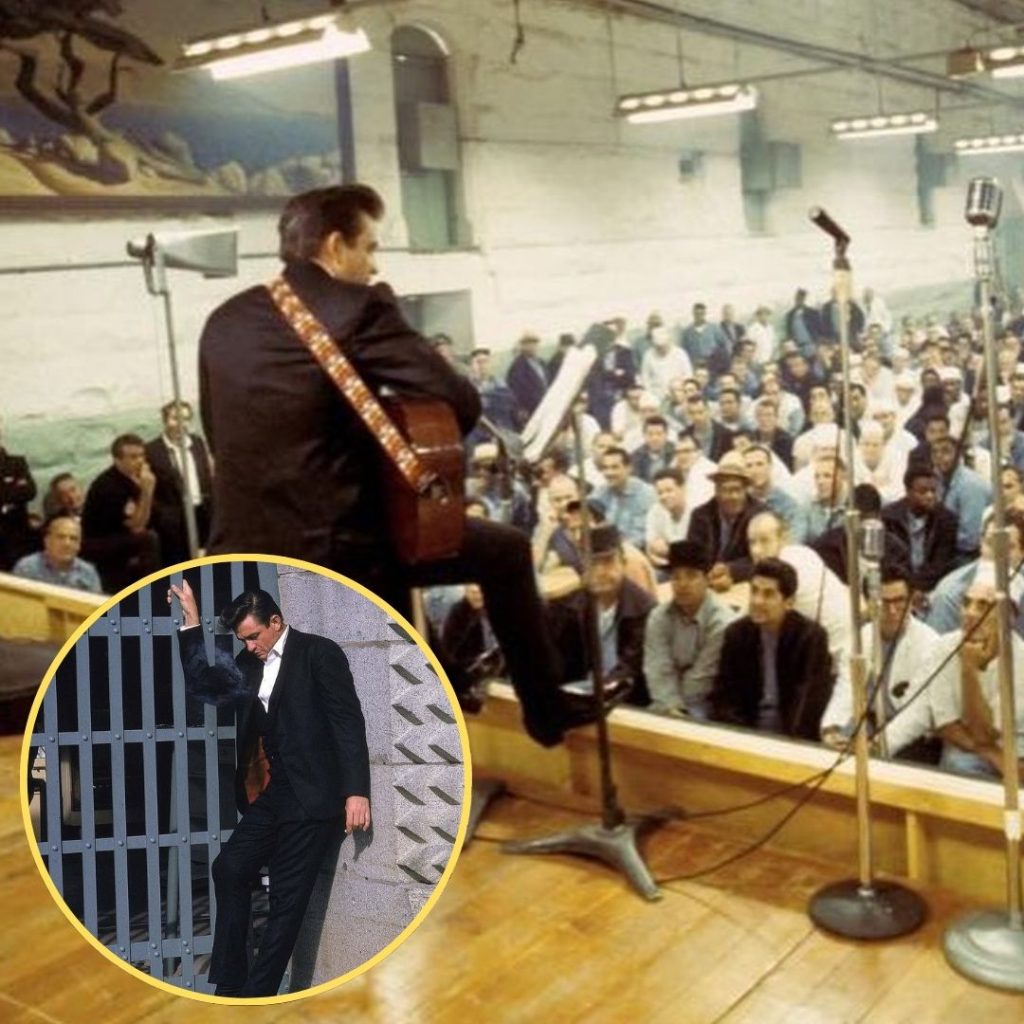Introduction
Johnny Cash’s “Folsom Prison Blues” is more than just a song—it’s a tale of pain, redemption, and the longing for freedom. The song, first released in 1955, quickly became one of Cash’s most iconic tracks. Known for blending country, rockabilly, and blues, it captured the heart of every listener, especially with its vivid narrative of a prisoner’s regret and desire for freedom. However, it wasn’t until Johnny Cash took the stage at Folsom State Prison in 1968 that “Folsom Prison Blues” became more than just a song—it became a symbol of redemption, a connection between Cash and his audience, many of whom were behind bars.
Scroll to the end of this article to listen to the full performance of “Folsom Prison Blues.”
The Composition of Folsom Prison Blues
- Title: Folsom Prison Blues
- Composer: Johnny Cash
- Release Year: 1955
- Album: With His Hot and Blue Guitar
- Genres: Country, Rockabilly, Blues
Background
Johnny Cash’s “Folsom Prison Blues” was inspired by the 1951 film Inside the Walls of Folsom Prison. The song tells the story of a man trapped in prison, haunted by his past and yearning for the freedom he once had. Written during Cash’s time in the U.S. Air Force, the narrative of the song reflects the emotions of those incarcerated and the deep sorrow that comes from regret. The song’s powerful imagery, such as the sound of a distant train whistle, resonated with many who had felt trapped by their own circumstances.
Released in 1955, “Folsom Prison Blues” became an instant hit, but it wasn’t until 1968 that the song reached a new height of fame. That year, Cash performed live at Folsom State Prison in California, recording a legendary album At Folsom Prison. The performance, which was released as an album, not only revitalized Cash’s career but also served as a turning point for the way music was perceived in relation to social issues like crime and justice.
Musical Style and Performance
The song blends country, rockabilly, and blues in a way that was both unique and influential. It features a driving rhythm, Cash’s signature baritone voice, and a memorable guitar riff. The music mirrors the themes of the song: confinement, regret, and the hope for redemption. As Cash’s voice delivers the lyrics, the guitar complements the emotion of the track, creating a sense of longing and despair.
Cash’s live performance at Folsom State Prison was unlike any other. In front of an audience of inmates, Cash wasn’t just a performer—he was a symbol of empathy and connection. His deep understanding of the marginalized and his ability to express their struggles through music allowed him to connect with the prisoners in a way no other artist had. The raw power of the performance, captured on the At Folsom Prison album, solidified Cash’s place as one of the most influential artists of his time.
The Power of the Lyrics
The lyrics of “Folsom Prison Blues” reflect the inner turmoil of a man who has committed a crime and is now paying the price for his actions. The line, “I shot a man in Reno just to watch him die,” is haunting and remains one of the most iconic in country music history. It encapsulates the character’s remorse and his realization that he cannot undo the past.
The song also touches on themes of isolation, regret, and redemption. Lines like “I know I had it coming, I know I can’t be free, but those people keep a movin’ and that’s what tortures me,” evoke a deep sense of yearning for a life that can never be. Yet, the song also offers hope, with the character expressing a desire for freedom—something as simple as escaping the walls of prison, symbolized by the whistle of the distant train.
Cultural Impact and Legacy
Johnny Cash’s “Folsom Prison Blues” has had a lasting impact on popular culture. The song has been featured in numerous films, TV shows, and documentaries, often used to highlight themes of justice, regret, and the prison system. It has influenced countless artists and musicians, and its raw portrayal of prison life has resonated with audiences across generations.
The live performance at Folsom Prison added a layer of authenticity to the song. Cash’s connection to the prisoners and his ability to voice their struggles created a moment of cultural significance that has endured. Today, the performance is seen as a turning point in Cash’s career and is considered one of the greatest live recordings in the history of music.
The Night Johnny Cash Took the Stage at Folsom Prison
On January 13, 1968, Johnny Cash took the stage at Folsom State Prison, in front of a captive audience of 2,000 inmates. What transpired that night became a part of music history. Cash wasn’t just performing for the prisoners; he was performing with them. The energy of the crowd, a mixture of excitement, pride, and relief, fueled Cash’s performance and created a unique bond between the artist and his audience. His song “Folsom Prison Blues” took on new meaning that night, becoming an anthem of redemption and the power of music to transcend barriers.
The album At Folsom Prison, which features the live performance, became one of Cash’s most successful albums, solidifying his place in the annals of music history. The concert at Folsom State Prison is often credited with reviving Cash’s career, which had slowed in the years leading up to the performance.
Johnny Cash’s Enduring Legacy
Today, “Folsom Prison Blues” stands as one of Johnny Cash’s greatest achievements. The song, which began as a simple narrative about a man’s regrets, evolved into an anthem of resilience, redemption, and the human spirit. Johnny Cash’s ability to connect with the marginalized and his willingness to use his platform to raise awareness of social issues have cemented his legacy as one of the most influential musicians of all time.
In addition to his musical achievements, Cash’s advocacy for prison reform and his ability to empathize with those who had been forgotten by society have made him a lasting figure in the fight for justice. His performance at Folsom Prison continues to inspire artists and activists alike, reminding us of the power of music to bring about change.
Conclusion
Johnny Cash’s “Folsom Prison Blues” is more than just a song—it’s a testament to the power of music and storytelling. From its humble beginnings as part of his 1955 debut album to its iconic live performance at Folsom State Prison, the song has captured the hearts of listeners around the world. Johnny Cash’s legacy continues to inspire, and his music remains a powerful force for change.
Video
Listen to Johnny Cash’s legendary live performance of “Folsom Prison Blues” below.
Video
Read More:
- Man Loses 360 Pounds Naturally: The Inspiring Journey and How the Internet Helped
- Tammy Hembrow’s Bikini Photos Stir Controversy: The Real Story Behind the Buzz
“Folsom Prison Blues” serves as a reminder of Johnny Cash’s impact on music and culture. His ability to turn the stories of the marginalized into art has made him an icon, and his legacy continues to inspire musicians and listeners alike. The performance at Folsom Prison not only revitalized Cash’s career but also gave a voice to those who had been silenced, proving that music is a powerful tool for empathy and change.



